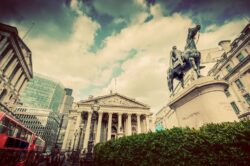Yesterday, my colleagues Boaz Shoshan and Sam Volkering gave you a peek inside the inner workings of their experiences in the traditional financial industry. And some of its flaws. Today, I’d like to share my own story of how I came to be investment director of UK Independent Wealth with Nigel Farage. And why I gave up a great career inside the “establishment” for the freedom of writing to you each day.
But how did I even end up there in the first place?
As my time at university came closer to an end, I had to decide what to do next. I wanted to work, not travel. Doing something that would give me a useful training and decent salary seemed the way to go. The world of finance fit the bill.
After many applications and interviews with various firms, I was offered a position as a graduate trainee at S.G. Warburg Group, starting in September 1993. It was the leading British investment bank at the time, so it wasn’t a difficult offer to accept.
G. Warburg had been created by two Jewish-Germans, Siegmund Warburg and Henry Grunfeld. They’d had the foresight to leave Nazi Germany in the 1930s, before it was too late.
Warburg and Grunfeld set up shop in London, and famously took on the crusty, nepotistic City establishment of the time. Despite its roots, S.G. Warburg grew to become the leading merchant bank in London, with a thoroughly British culture.
When I joined, suits were well-cut, shirts were double-cuffed, and at some meetings it was compulsory to wear a jacket. I remember one poor chap that once turned up with a short-sleeved shirt under his suit. He was sent home to get changed. S.G. Warburg was formal and it was old school.
It was also low key. There was no glitzy sign above the office entrance and employees were expected to behave modestly. About a year after I joined, another member of my graduate trainee class got into trouble when he forgot this.
He’d been on a train journey with some colleagues where he was loudly bragging about his job and how much he got paid. Unfortunately for him, the boss of one of the bank’s major corporate clients was within earshot. The client later phoned S.G. Warburg’s chairman to complain about this unseemly public display, and the employee was summarily fired for damaging the bank’s reputation.
Despite the time that’s elapsed since, I’ve kept a copy of the bank’s annual report for the year to 31 March 1994. It has a plain dark green cover with discreet white text – totally consistent with the bank’s low-key culture at the time. Inside, and in stark contrast to the flashy corporate reports published by companies these days, there isn’t a single photo. There aren’t even mug shots of the chairman and chief executive.
Unfortunately, the bank got into trouble shortly after that report was published. Its bond traders got caught out when the US Federal Reserve sprung a surprise on the markets and suddenly raised interest rates. The bond department took a huge loss and, long story short, S.G. Warburg fell into the arms of Swiss Bank Corporation (SBC), a large Swiss bank (who got to buy it at a knock-down price).
The 1990s and early 2000s were a boom time in the global investment industry. They featured a lot of mergers and acquisitions, as big banks tried to get even bigger as fast as possible.
By 1998, SBC was to merge with Union Bank of Switzerland, a Swiss rival, to create today’s UBS Group. In 2000, UBS bought Paine Webber, a big US retail brokerage. Lots of smaller acquisitions happened along the way.
Somehow I survived the carnage of redundancies after each takeover, and carved out a career. For example, when SBC and UBS merged, about 40% of the combined staff in the investment bank divisions were laid off. It was far worse than that in some departments.
As a result of this globalisation, the culture changed dramatically too. Although I stayed for 15 years in total, I joined the leading British investment bank but left a global, Swiss-American, investment services behemoth.
S.G. Warburg had about 4,500 employees when I joined. UBS had about 84,000 employees by the time I left, more than 18 times as many. It had transformed into a very different beast.
The nature of the investment industry generally changed completely. Long gone were the days when relationship bankers gave advice based on a client’s best interests, which was a long-term approach to business. Instead, it was all about selling more products and services now, irrespective of whether they made sense for customers. The industry had become extremely short-term oriented.
Working for any big investment bank is highly demanding. When I was posted to Hong Kong in the early 2000s, my average day was 14 hours of intensive activity. I’d arrive at 8 am and leave around 10pm, grabbing a sandwich at lunch time and eating it at my desk. Often I worked weekends too, or didn’t leave the office until 2 or 3am. It was intense.
Now, I’m not for a second saying I regret my time there. I had a first-class financial training… got to work in lots of interesting places around the world… worked on complex corporate strategies, acquisitions and joint ventures… and, generally speaking, was surrounded by highly competent and professional colleagues. It was varied and exhilarating work.
But it came with major downsides. I felt that a significant minority of the people that work in investment banks are best described as sociopaths. That means they’re characterised by disregard for other people.
When a sociopath is operating within the competitive context of an investment bank, their only motivations are power and pure greed. As a close colleague memorably described one of the worst of this breed: “He’d sell his granny for a dollar.”
Unfortunately, in the aggressive world of money, many of those people rise near to the top (although mercifully few actually make it to board level, where some degree of decorum is still a requirement). Dealing with such people on a regular basis became a major drag. All they want to do is get richer and more powerful. They’ll use any means to get there.
On top of that, huge corporations are massively bureaucratic and full of tedious office politics. In 2005 I moved back to London from Hong Kong, meaning closer to the centre of the corporate empire. I quickly found it a soul-destroying place after the excitement and growth of Asia.
What’s more, I no longer felt that I was learning much that was new and the future career paths open to me looked rather dull. Those jobs would perhaps come with more money, but still with long hours, more of the power politics, and even more time fending off the sociopaths.
I also had young kids by then and didn’t fancy being a mostly absent father as they grew up. By late 2006, my mind started to turn to what to do next.
Then the global financial crisis (GFC) struck. Or rather, I spotted the early signs of it. Late in the first quarter of 2007, or perhaps early in the second quarter, HSBC was the first bank to report multi-billion-dollar losses from US sub-prime mortgage lending gone bad. Since HSBC had a reputation for being a risk-averse sort of place, this was a major red flag for me.
The GFC got rolling after a long boom period in financial services, although with some wobbles along the way. My gut feeling was that things were going to get really bad.
Given I’d pretty much already decided I wanted to do something else anyway, I sold as many of my executive shares and stock options as I was allowed to in the first half of 2007. As it turned out, this was right around the pre-crash peak for bank shares. My actions saved me taking a really big loss.
So there you have it. That’s how and why I left the traditional financial industry.
While in it I’d enjoyed a great training, learnt a vast amount, and worked around the world with interesting and knowledgeable people. But I felt the industry’s culture had changed massively from acting in clients’ interests to simply selling as much as possible.
What’s more I’d become fed up with the sociopaths, the pure greed, the office politics, long hours and long-haul business travel. I now had kids and wanted to see them grow up. And the gathering GFC was a clear signal that the good times were about to end.
I stuck around just long enough to collect a final bonus (I’m not stupid) and then finally escaped in mid-2008, just before the GFC reached its crescendo.
Not once since then have I ever regretted my decision to leave. And I’m still thankful for what I learnt while I was there.
A new chapter
While the investment banking industry morphed into a new being, something different was being born elsewhere. The internet had turned into a publishing medium. It allowed anyone to post their views directly to anyone who wanted to read them.
That sounded like a world I wanted to be involved in. With the freedom to write what I believed in, and no “corporate line” to toe. I could declare to anyone who decided they wanted to listen what my opinions were. If they were valuable, it’d be successful.
And that’s how I came to be investment director of Nigel Farage’s UK Independent Wealth. Where I give specific investment guidance, but people can decide for themselves whether they agree or disagree, and whether they want to act on my recommendations.
Right now, we’re inviting new subscribers to join what we call Britain’s Great Wealth Revival. It’s our attempt to help you take back control of your financial life from the industry I left in 2008.

Rob Marstrand
Investment Director, Fortune & Freedom




